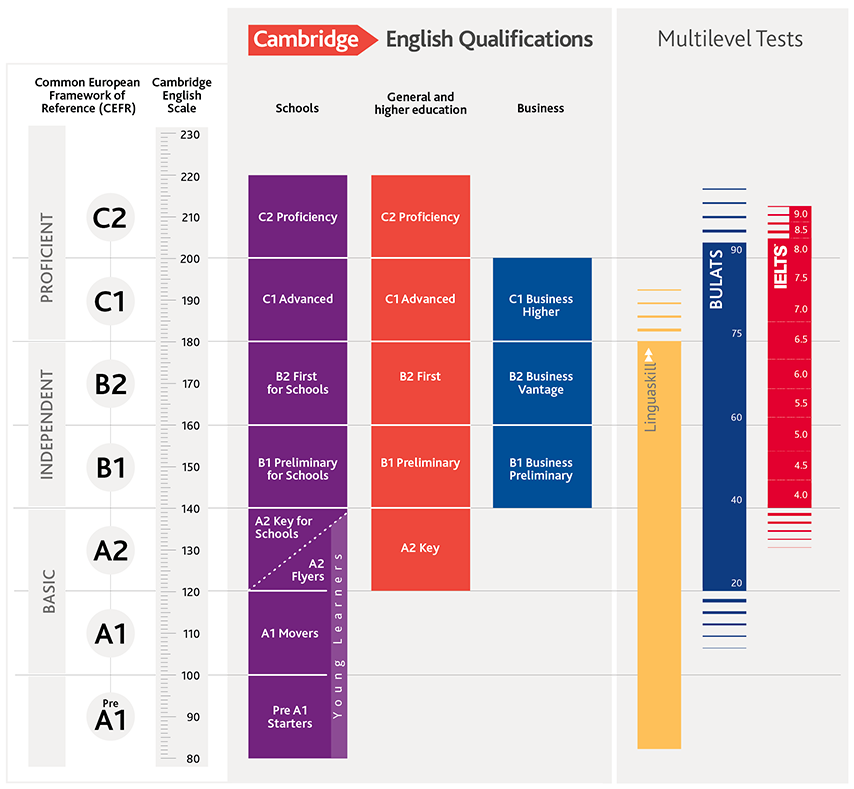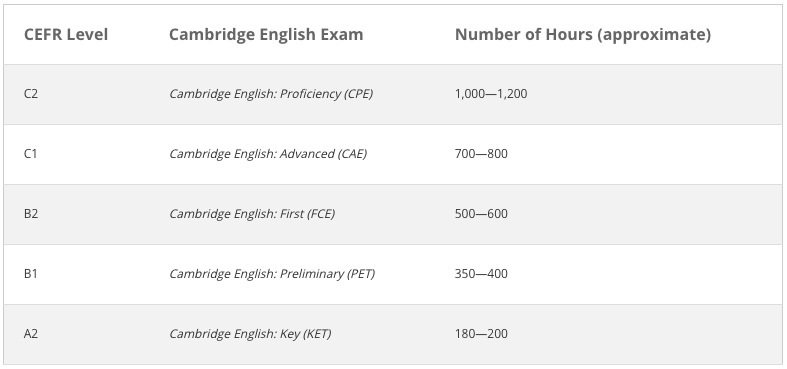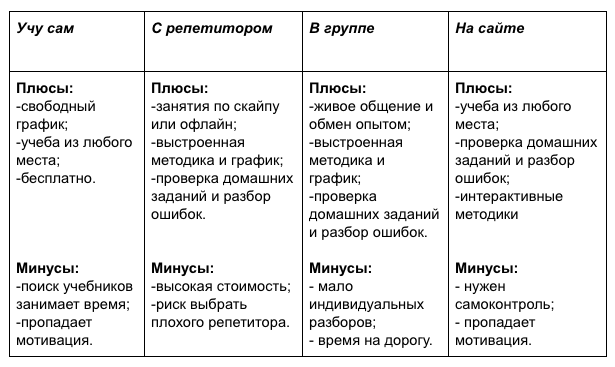We describe how to determine the time to reach a particular level of language in English, depending on your schedule and intensity of classes. The technique is suitable for any purpose: to pass the exam, speak in a foreign language or have an interview.
Determine the language level
Before you schedule your classes, determine the level of the language. This can be done with the help of online tests with questions on grammar and vocabulary. Usually, first in the test are easy questions, then - more difficult.
Test Puzzle English : registration is required, the test assesses listening skills and grammar knowledge, the result is shown automatically.
Placement test : test yourself using the keys on the site.
Cambridge English : no registration required, there are options for adults and schoolchildren.
Test results are a convenient starting point. After that, you can set a goal, select training materials and make a schedule.
Set a goal
The goal may be an IELTS exam, an interview with an international company or the ability to keep up a conversation with foreigners. Most often, the goal coincides with the level of the language: the university is received from C1, small talk (this is what everyday conversation on everyday topics is called, for example, with neighbors or friends who happen to be in the store) begins with B1-B2, and you can read with a dictionary from A2.
There is an
infographic on Cambridge English website, it shows how the level of the language corresponds to the level of education: A2-B2 is a school curriculum and vocabulary, from B2 to C2 is a university and business.

The infographic shows how many levels need to be overcome in order to achieve the desired result.
Counting hours
Calculate how long it takes to reach the desired level of language and purpose. You can do this on the
Cambridge English nameplate .

For example, your level is A2, and you want B2. According to Cambridge English, this will take 400 hours.
The numbers on the
Education Index website are slightly different: here the authors write that there is a difference of 360 hours between A2 and B2.
In any case, such numbers are not a strict rule, but rather a recommendation. It is possible that you will need less time. But when choosing a methodology and schedule of classes, it is better to build on the maximum value.
Choose a method
Decide on a learning method. Choose the most convenient and efficient for you. It is optional to stop on one option, it is possible to combine two or three methods. For example, learn English yourself and engage in ready-made methods on the site.
In the table - the main pros and cons of different methods for learning English. You can make your own to understand what methods are suitable for you.

Determine the intensity of classes
Once you have decided on the method, we will make a schedule of classes. Here you should focus on several factors: how many hours a week are you ready to devote to English, what is your working / study schedule and what time is it more convenient to study.
For example, schoolchildren and students usually do not study at weekends and can spend two to four hours in English on Saturday or Sunday. Workers and office workers may be able to spend 30 minutes at lunch time and in the evening, and devote the weekend to the family. If you are a freelancer or on a free schedule, then the schedule can be structured so that every day you go through a new topic or grammar unit - it will take from 30 minutes to two hours.
If you want to raise the level from A2 to B2, then lay 400 hours of classes.
For schoolchildren and students: 400/4 hours per week (only on weekends) = 100 weeks.
For workers: 400/1 hour per day = 400 days.
For freelancer: 400/2 hours per day = 200 days.
Naturally, such calculations are approximate. You can practice more or less. The main thing - regularly and systematically, with the performance of tasks on vocabulary, grammar, listening and writing.
We imitate the language environment and start classes
Before you start classes, create a language environment around you: translate gadgets into English, change your language on social networks, listen to the news only in English, arrange evenings at the office or even days of English (as we
did ).
If this approach seems uninteresting, try learning professional vocabulary or neologisms in English.
Here are some useful resources to learn English with more easily:
-
BBC Learning English site with free podcasts and interactive vocabulary and grammar exercises;
- interactive exercises for different levels from
Oxford University Press ;
-
British Council site with free resources for different categories, skills and ages;
- our site
Puzzle English with a lot of grammar tasks and training for pumping listening and writing.
And to all readers of our blog, we traditionally give a
coupon for 500 rubles for the purchase of a subscription, which allows you to remove restrictions on the use of services.